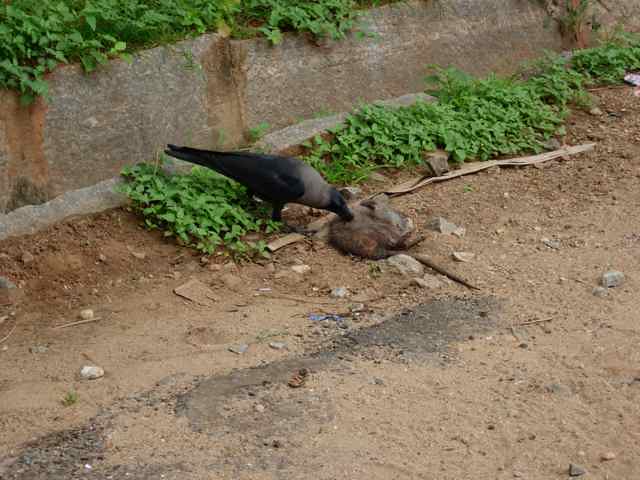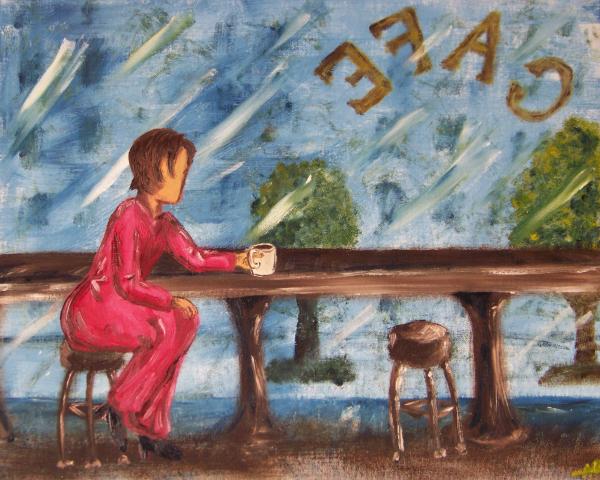Do I know what education is now? Do I feel 'educated'? How different is it from engineering?
I do not know to what extent I can answer that. Nor am I entitled to voice an opinion against this 'idea' of education that linger in my mind. Sitting here on this revolving chair, looking outside at Mumbai's erstwhile dump yard - Chembur, one can't help wonder or in fact question whether knowledge is simply passed on through textbooks, assignments and JSTOR. Did text books and classroom knowledge help convert the waste-yard that was Chembur to the extended city that is Chembur? Having lived for more than two years, the carp knew every pebble in the tank? But did she know the world?
The pigeon which had been constantly trying to make a nest all this while, seem to have given up. Isn't it interesting how the birds have adapted so much to human life. Where did the pigeons make their nests before humans started making these big buildings? Out in the open they must have been an easy prey.
I remember sitting, dressed up to please the interview panel from XLRI, in a luxury hotel in Bangalore. The watchman was trying shoo away the pigeons from their resting place on the eastern balcony. Sun light simmering through, as silhouettes discussed frantically about inflation and GDPs.
During the interview they had asked me what i planned to do with my MBA. I had given the answer as I had rehearsed but they were not convinced. So they had asked me again.
"What do you want to do in life?" I still remember how everyone at that juncture had shifted their focus from whatever they were doing. This was the make or break question. I had anticipated this question prior to the interview but somehow I chose not to give away the answer I had thought of. Instead I sat still for two minutes. Not photography, not travel, not meet new people. My mind kept blocking my options as I searched for the right answer. Such situations can be incredibly tiring. Even minutes drain more energy out of you than a work-out in a health club. And finally I broke the silence that probably was the laughing stock in their post interview discussion.
"I want to change the educational system in India."
I knew I had dug my own grave with that answer. I knew I had stayed in Bangalore for a week wasting parents' hard earned money for absolutely nothing. But the confidence with which I defended wave after wave of questions is something I still can't come to terms with. The fact that I believe a college or a school is not giving you 'education' yet pursuing one...
Sometimes I wonder what I have gotten myself into. The promised land across the black sea has not turned out to be green. In fact I can't decide which among the banks were more greener. I am now in the world of academics. Where knowledge is a brutal war. There exists a bread and one thousand hungry minds. They will cut it, share it, reuse it, reproduce it, patent it, copyright it, plagiarise it... And then claim to have saved man kind with their 'knowledge'. All a day's work.
Two weeks they give, to go out and see the world, get the data and produce 'knowledge' called dissertation. Their brilliant scheme to make the world a better place.
I am troubled. Some years ago I realised that I was a product, one among millions, on a conveyor belt that would dictate my destiny. I had struggled, pushed, shook, broke, to gather enough momentum that would help get out of the conveyor belt. And I had succeeded. But now I realise, that I had only fallen into another belt. Is there no escape from this world? These people, these faces that I see around me. Do they know what is happening? Why are they smiling at me? Have they tried getting out of the system themselves? Is there a way out? Have they given up? Are they who control the system?
I will escape. I wont give up...
1 There is a belief in the college that sports is what engineering students do in four years of college. So much for future social scientists.↩







 11:05 PM
11:05 PM
 Nevin
Nevin






































